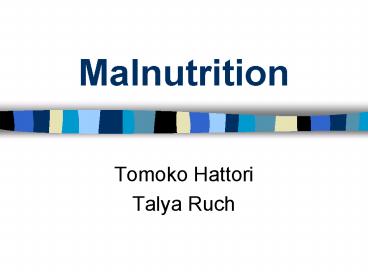Malnutrition - PowerPoint PPT Presentation
1 / 17
Title:
Malnutrition
Description:
Source: Andrew Tomkins and Fiona Watson, Malnutrition and Infection, ACC/SCN, Geneva 1989 ... in past: lack of protein stored in the body ... Marasmus ... – PowerPoint PPT presentation
Number of Views:537
Avg rating:3.0/5.0
Title: Malnutrition
1
Malnutrition
- Tomoko Hattori
- Talya Ruch
2
What is malnutrition?
The result of combination of Inadequate Dietary
Intake and Infection
3
Inadequate dietary intake/disease cycle
Source Andrew Tomkins and Fiona Watson,
Malnutrition and Infection, ACC/SCN, Geneva 1989
4
Inadequate dietary intake
- Protein-energy malnutrition(PEM)
- in past lack of protein stored in the body
- current lack of energy stored in the body
- Micro-nutrient deficiencies
- Iodine
- Vitamin A
- Iron
- Zinc
5
Malnutrition and Child Mortality 12 Million
Children U5 who die each year in developing
countries
Source WHO, based on C.J.L. Murray and A.D.
Lopez, The Global Burden of Disease, Harvard
University Press, Cambridge (USA) 1996 and
'Epidemiological evidence for a potentiating
effect of malnutrition on child mortality' in
American Journal of Public Health 1993-83.
6
Prevalence of Malnutrition
Source http//www.unu.edu/hq/food/8F103e/8F103E01
.htm
7
Causes of malnutrition
Source the state of the worlds children 1998,
Unicef, 1998
8
Effects of Malnutrition
- Growth failure in children
- Reduce physical activity, agility, and job
ability - Impair mental capacity
- Reduce resistance to disease
- Longer recovery time from illness
- Increase mortality rate (MMR,IMR)
9
Assessing nutritional status
- Weight for Age lt80 Underweight
- Height for Age lt90 Stunting
- Weight for Height lt80 Wasting
10
Forms of PEMltKwashiokorgt
Source Kari S. Lankkinen, Health and disease in
Developing Countries p300, Macmillan, 1994
11
Forms of PEMltMarasmusgt
Source Kari S. Lankkinen, Health and disease in
Developing Countries p301, Macmillan, 1994
12
Current Technologies and Approaches
- Assessment
- Growth Monitoring
- Arm Circumference
- Breast-Feeding
- Baby Friendly Hospital Initiative
State of the Worlds Children 1998. Focus on
Nutrition. UNICEF
13
Current Technologies and Approaches
- Triple A Approach
- Assessment
- Analysis
- Action
- Micro-nutrients
- Social Mobilization
- Fortification
- Supplementation
State of the Worlds Children 1998. Focus on
Nutrition. UNICEF http//www.worldbank.org/html/ex
tdr/hnp/nutrition/enrich.htm
14
Programming Issues
- Political issues
- International commitment?
- War
- Socio-economic issues
- Unequal distribution of resources
- Household food security? Access to food?
- Production of food and non-food
- Socio-cultural issues
- Beliefs as a barrier
15
Controversies
- Growth Monitoring
- The standards come from a restricted US
population - HIV Transmission and Breast-Feeding
- 14 risk of HIV transmission
- milk substitute fed babies are15 more likely to
die of diarrhea - Food Supplement Programs
- time an resource consuming
- Thwart efforts to change mothers feeding habits
16
New Developments
- De-Worming- magic bullet
- Complementing Breast-Feeding
- Over Nutrition
- Obesity
17
The World Food Summit (Rome, 1996)
- Sustainable food security for all
- Social and economic environment to achieve food
security - Reduce inequality and poverty
- Attention to women
- Importance of Breastfeeding
- Participatory and sustainable rural development
policy - Trade policy































